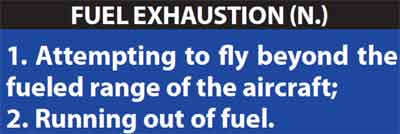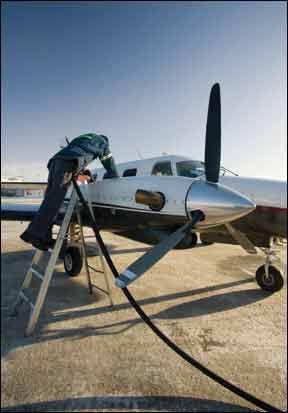I need to wrap my head around how people run out of gas in airplanes.” Ive been saying that to myself (and my editor) for over a year, marveling at how almost half of all known engine failures are due to fuel mismanagement. Most of those result from fuel exhaustion: attempting to fly beyond the fueled range of the aircraft, or more simply, running out of gas. Very frequently the pilot almost makes it, landing just short of the planned destination. How could a pilot take off with less fuel than 288 needed to complete a trip? Shouldnt it be a pilot imperative to have enough fuel not just to meet the preflight planning requirements of FAR 91.151 or 91.167 as appropriate, but also to be certain there would always be enough fuel on board to make it safely to an airport, regardless of the conditions encountered en route? Ive found, by studying accident reports and talking to a lot of pilots, that most fuel exhaustion events arent so much a matter of a pilot saying, “Ill burn 10 gallons per hour and have 40 gallons of fuel, so Ill try a 500-mile trip based on a 120-knot ground speed” (Hint: this would require 42 gallons). When I said I needed to “wrap my head” around the issue I was on the right track. Im detecting a distinct pilot psychology of fuel exhaustion. The good news from this is we can look for clues in our own thinking that will help us avoid running out of gas. Point of No Return A colleague recently flew from the San Francisco Bay Area to Wichita to meet with me. He is relatively new to his single-engine turboprop, so he brought along another pilot to help with some of the cockpit chores. They planned a nonstop trip of about four hours but, before takeoff, identified Lamar, Colo., (about 45 minutes west of Wichita in the turboprop) as an alternate if they determined en route they would not have enough fuel to make Wichita without a 45-minute fuel reserve. They encountered an unusual eastbound headwind in the low flight levels, so groundspeed was lower than expected and their four-hour trip stretched longer. They diligently recalculated fuel burn and determined they would make Wichita with 40 gallons of Jet A remaining, what the pilot considered his absolute minimum. Passing Lamar, they made a last fuel calculation and committed to continue to their destination. When they descended out of a marginal VFR ceiling and touched down at KICT, both were excitedly talking about making it with just enough fuel to spare. The pilot told me he estimated he had come in right at his 40-gallon personal minimum. 400 After the turboprop was fueled, however, the pilot learned he had only a little more than 20 gallons remaining on board. Hed been directed to lower altitudes for the last 100 miles or so of his trip, and vectored around on the approach. Being new to turbines, he had not accounted for the big increase in fuel burn at lower altitudes. And he realized he had rationalized continuing nonstop by knowing there were a lot of airports in the Wichita area if he was coming up short on fuel. Ultimately, however, the pilot told me he had not really considered landing anywhere but Wichita after he passed Lamar-subconsciously considering it a “point of no return” after which passing he considered himself “committed” to continuing to Wichita. Although he landed without incident, he is now very uncomfortable with how closely he came to fuel exhaustion. It wasnt that the pilot had not planned to have enough fuel on board for the trip. And its not that he failed to consider an alternative to nonstop if groundspeed was lower than he anticipated, because he had. No, the pilots near fuel emergency was really the result of a psychological issue-once he passed his decision point, his mind was closed to alternatives to his planned destination, even though he and his passenger/copilot were both very aware of their dwindling fuel reserves. Winds of Denial Several years ago I was a guest at a dinner held by a flying club. During dinner I overheard a conversation at the table behind me. One of the pilots had recently ditched his four-seat airplane into the ocean after running out of fuel. He had made it close enough to the beach that everyone waded ashore, but the saltwater-soaked airplane was a total loss. The story was more interesting because the pilot was suing the provider of his preflight weather briefing over the loss. He had telephoned for a weather briefing the morning of the flight, receiving a standard weather briefing including forecast winds aloft. He didnt know it at the time, but the weather briefer erroneously provided the winds aloft forecast from the night before. Although the pilot called and received a second, abbreviated briefing before his afternoon takeoff, he did not get an update on forecast winds aloft. He did relate (in the overheard conversation) being told a weak front had not passed through as rapidly as expected. Once he was airborne he noticed his groundspeed was lower than expected for the (planned) four-hour trip, but he held out hope for improvement closer to destination because “the forecast said” hed have a tailwind. The pilot knew his progress was impeded by headwinds. He should have known this meant he would burn more fuel than planned to get to his destination. But he believed the headwinds would turn to tailwinds because the forecast said so; he never even considered landing at one of the many oceanfront airports he passed along the way. More tellingly, even after crashing into the surf he was not willing to accept that he was at fault, for not detecting the reduced groundspeed and determining he could not make it nonstop. It was someone elses fault-he was psychologically unprepared to accept his personal responsibility as pilot-in-command. Idol Worship The Internet gives us an unparalleled ability to share information. Aviation is one of the most popular topic of online chat lines and bulletin boards. The trouble with online postings is that its hard to tell the difference between the writing of a highly experienced expert and the ramblings of a wanna-be. And when the posters qualifications are beyond repute, other, less-qualified participants may think “its easy” because it looks so in a brief e-mail. Wanting to be superb pilots themselves, they convince themselves they, too, can do what their online idols have done. I knew a pilot who was a devotee of a chat line that featured some very highly experienced pilots. Often the topic would turn to maximum-endurance flying, trips so far-reaching that the pilot had to burn each tank of fuel completely until the engine quit, switching to another tank with fuel remaining, until arriving at destination with the minimum amount of fuel remaining in only the last tank selected. For a time it became sport to boast online of the time spent aloft on nonstop trips, and of arriving with the least amount of fuel remaining on board. The pilot in question was not nearly so experienced, but frequently posted about maximum-endurance flying and landing with minimum fuel. Then one day I heard that, the night before, he had run an airplane out of fuel on final approach to his home airport. He crashed into a ditch and, because he was not wearing the shoulder harness installed in the airplane, suffered massive head trauma that soon took his life. Well never know whether the online one-upsmanship played any part in the pilots decision to overfly numerous open airports that could have supplied more fuel on his last night cross-country. But psychologically, the pilot appeared driven to prove his mettle so he could boast online with the high-timers about his ability to make it nonstop. Factoring In The prevailing wisdom is that fuel exhaustion results from poor preflight planning, or failure to check fuel levels before flight to ensure the fuel available is greater than the fuel required. Although thats certainly true in some cases, history and some anecdotal evidence suggest there are some purely psychological factors that may better explain why so many pilots come up just short of destination. Do your preflight planning and double-check your fuel loads, but also do a preflight and repeated en route check of your psychological reasons for making range-related decisions.





